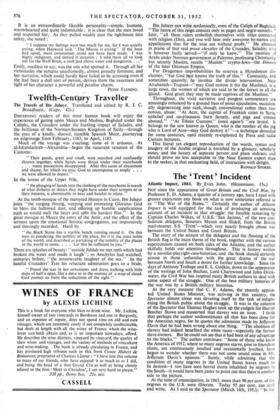Twelfth-Century Traveller
The Travels of Ibn Jubayr. Translated and edited by R. J. C. Broadhurst. (Cape. 42s.) DISCERNING readers of this most human book will enjoy the experience of gazing upon Mecca and Medina, Baghdad under the Caliphs, the Crusaders under the hurtling impact of Saladin, and the brilliance of the Norman-Saracen Kingdom of Sicily—through the eyes of a kindly, shrewd, irascible Spanish Moor, journeying on pilgrimage from February, 1183, to April, 1185. Much of the voyage was exacting; some of it arduous. At al-Iskandariyah—Alexandria—began the recurrent vexation of the Customs: " Their goods, great and small, were searched and confusedly thrown together, while hands were thrust under their waistbands . . . many possessions disappeared. After this scene of abasement and shame, for which we pray God to recompense us amply . . . we were allowed to depart."
In the towns of the Upper Nile, " the plunging of hands into the clothing of the merchants ii search of what dirhems or dinars they might have under their armpits or in their bosoms, is abominable to hear and hateful to relate. "
At the tomb-mosque of the martyred Husayn in Cairo, Ibn Jubayr joins "the surging throng, weeping and entreating Glorious God to bless the hallowed dust, and offering up humble supplications such as would melt the heart and split the hardest flint." In the great mosque at Mecca the entry of the Amir, and the effect of the sermon upon the emotional Semitic congregation, are impressively and movingly recorded. Hard by " the Black Stone has a marble bench running round it. On this men sit pondering the nobility of the place, for it is the most noble of the world, and described as partaking of the nobility of the places in the world to come. . . . Let this be sufficient to you."
There are splashes of beauty: "outside Jiddah we met reefs which had broken the water and made it laugh"; so Aeschylus had watched, centuries before, "the innumerable laughter of the sea." In the hateful Crusaders' Tyre his reluctant admiration goes to a bride.
" Proud she was in her ornaments and dress, walking with little steps of half a span, like a dove or in the manner of a wisp of cloud. God protect us from the seductions of the sight." Ibn Jubayr can write sardonically, even of the Caliph of Baghdad: "The lustre, of this „reign consists only in pages and negro eunuchs." later, "all these rulers embellish themselves with titles connected with religion (Din), and you will hear only awesome by-names and appellations that kir the wise are without profit." He abounds in praise of that real preux chevalier of the Crusades, Saladin; who is however badly served—"if only he knew." The mention of Arabs under Norman government at Palermo, professing Christianity but secretly Muslim, recalls "Muslim" crypto-Jews—the Donnie: of the later Ottoman Empire.
For Dragoman improbabilities he reserves a Herodotean dis- claimer; "but God pest knows the truth of this." Constantly, and sometimes quaintly, he invokes the divine intervention. Near Atrabanish—Trapani—"may God restore it (to the Muslims), is a large town, the women of which are said to be the fairest in all the ialland. God grant they may be made captives of the Muslims." Throughout, the vivid narrative and pungent commentary are amusingly enhanced by a ground bass of pious ejaculation, occasion- ally degenerating into rank, though conventional rather than ran- corous, abuse: "At Acre, the capital of Frankish cities in Syria, unbelief and un-piousness burn fiercely, and pigs and crosses abound." "At Tibnin Customs" (once .again!) "are levied. It belongs to the sow known as Queen, who is the mother of the pig who is Lord of Acre—may God destroy it !"—a technique demoded for some' centuries, until recently re-exploited by Press and radio Curtain lecturers.
This literal yet elegant reproduction of the words, syntax and imagery of the Arabic original is enriched by a glossary, scholarly notes, and the luxury of separate person and place indexes; and should prove no less acceptable to the Near Eastern expert than to the seeker, in that enchanting field, of instruction with delight.
RONALD STORRS.


































 Previous page
Previous page